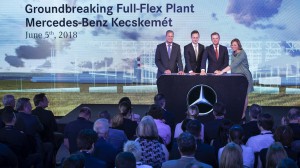Despite the Trump administration’s threats to impose steep tariffs on European-made vehicles and continuing pressure from the Peoples Republic of China to build vehicles locally in China, Daimler AG is investing 1 billion euros in a new factory in Hungary.
Mercedes-Benz Cars has broken ground for what it describes as a “full-flex-plant,” which can build multiples vehicles on one assembly line as market demand shifts, at a site next to an existing plant in Kecskemét, about 90 kilometers such of Budapest.
The project is expected to create 2,500 jobs by the time it is complete in 2020.
“In a ‘Full-Flex Plant’, several vehicle architectures from compact models to rear-wheel drive sedans and various drive forms, including electric vehicles, can be flexibly produced on one line. Thereby we lift the production concept of ‘Factory 56’ to the next level,” said Markus Schaefer, member of the Divisional Board of Mercedes-Benz Cars, Manufacturing and Supply Chain.
(Trump wants to drive German luxury brands out of the U.S. Click Here for the story.)
The plant in Hungary is the next step on the road to smart production and is designed for sustainable production while using digital tools to put employees at the center of all activities, Schaefer said.
When it’s finished the new plant in Kecskemét will include a press shop, a body-in-white shop, a paint shop and an assembly. The plant is highly efficient and has a CO2-neutral energy supply. It will be capable of producing passenger cars with a wide variety of body and drive variants as well as electric vehicles using the latest technology in automated driving.
(Click Here for more about Mercedes tooling up French EV plant.)
“Our existing Mercedes-Benz plant has been a real success story since it started production in 2012. Here we produce compact vehicle with front wheel drive architecture for the world market,” said Christian Wolff, CEO of Mercedes-Benz Manufacturing Hungary.
“The second plant in Kecskemét not only contributes to the growth of the Hungarian auto industry but also provides future generations with direct access to international expertise and creates attractive, long-term jobs,” he added.
(Daimler profits drop double digits despite strong car sales. Click Here for the story.)
From the very first component, the production sequence at the new plant is defined as in a pearl chain. In the body-in-white shop of the future, the individual stations are flexibly combined. With the flexibility, different derivatives of a series can be manufactured simultaneously, which now requires several specific production lines.


Part of their “Make Hungary Great Again” campaign.